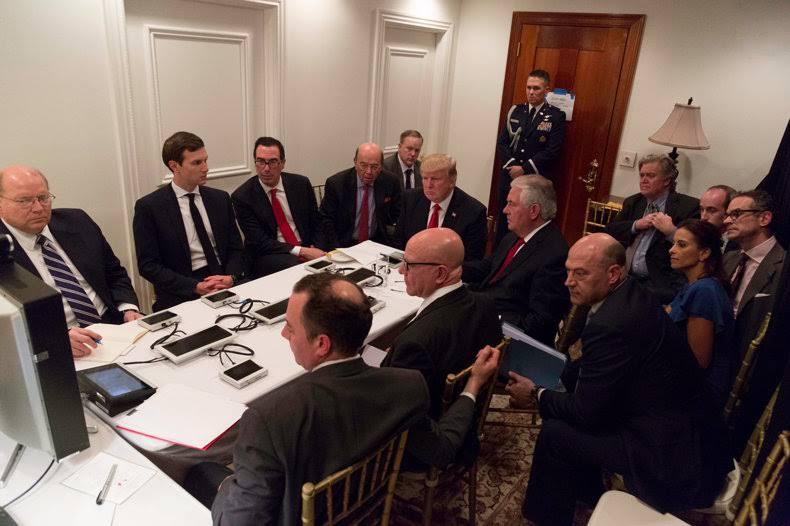
Donald Trump’s decision to launch cruise missiles against a Syrian airbase last week has drawn deserved condemnation from his supporters—and won him strange new respect from John McCain and the mainstream media. Soon after the attack, the progressive media watchdog FAIR counted 18 op-eds in the New York Times, Washington Post, USA Today, Wall Street Journal, and the New York Daily News supporting the action. There were, at first, no opposing views.
Trump is not yet a war president, however. Last week’s strikes pales in comparison to Ronald Reagan’s 1986 bombing of Libya or the routine bombing of Iraq that took place under George H.W. Bush and Bill Clinton, while the U.S. enforced a no-fly zone and other restrictions on Saddam Hussein’s regime. The closest parallel to Trump’s shot at Assad might be the “Monica missiles”: Clinton’s 1998 cruise-missile strike against a pharmaceutical factory in Sudan. That pyrotechnic display, like Trump’s, accomplished nothing. But it also was not the beginning of a deeper engagement in Sudan, and Trump may yet refrain from repeating in Syria the mistakes that George W. Bush and Barack Obama made in Iraq and Libya. If Americans are lucky, this attack will turn out to be sound and fury, signifying nothing.
The administration has given conflicting accounts of its aims. Nikki Haley, Trump’s ambassador to the United Nations, has told CNN, “There’s not any sort of option where a political solution is going to happen with Assad at the head of the regime.” But Secretary of State Rex Tillerson insists “there’s been no change” in the administration’s objectives, which until now have prioritized defeating ISIS. National Security Adviser H.R. McMaster did not clarify much in an interview with “Fox News Sunday,” where he avoided saying whether Assad would continue to be a target of the U.S. even as the struggle against ISIS rages on.
Averaging together what all three officials have said, though, a murky picture emerges. The administration still seemingly wants to prioritize the campaign against ISIS, mostly carried on by U.S. partners and proxies. The White House would like to see Assad replaced, possibly while keeping his regime intact under some other leader. McMaster suggested that Russia could exert pressure to remove Assad, and in any event, while this outcome was to be wished for, it was not necessarily one that the U.S. would attempt to achieve itself. “I’m not saying we are the ones to effect that change,” he told Fox.
There is a great deal of wishful thinking here, but not, as yet, a commitment to war for regime replacement. That will change, however, if Senator McCain and the bloodthirsty media get their way.
If President Trump primarily wanted to make a point about the unacceptability of anyone’s use of chemical weapons, he may have sent the wrong message. Interventionists believe that by showing the U.S. is willing to punish those who use chemical weapons, their use will be deterred. But terrorists and hostile states may well reach an equally logical conclusion: if you can foment a chemical attack, one way or another, and pin it on your enemies, you can guarantee that you will enlist the U.S. as your air force (and perhaps more). Is al-Qaeda above stooping to such means? Is ISIS? What about the “moderate” Islamists with whom the U.S. is already cooperating in the campaign against the Islamic State?
Assad is a brutal dictator fighting an even more brutal civil war. But there is more than a horror of brutality behind the drive to depose him. After all, the brutality of the civil wars and insurgencies that arise in the wake of U.S. interventions in places like Iraq and Libya never deter our preciously moral militarists from calling for the next war. Assad is not just Assad: he is also his allies, Vladimir Putin and Iran. As the early months of the Trump administration have already shown, the U.S. has no shortage of pundits who see Putin’s Russia the way the most ardent Cold Warriors saw Soviet Russia. Iran, meanwhile, remains the Great Satan of neoconservative eschatology. Assad must fall, even if that means Islamists take Syria—who else is there?—in order to teach Moscow and Tehran a lesson: they’re next.
Donald Trump won the White House because he rejected this whole way of thinking. He did not back down from condemning George W. Bush’s Iraq War even in the Republican primaries, and he won the party’s nomination. He was pilloried by Hillary Clinton and the media throughout the general election campaign as Putin’s puppet, yet he steadfastly refused to placate the critics. And while he made clear how much he disliked the Iran deal, he said he would renegotiate it, not tear it up.
America has cut deals with illiberal regimes before. And have no doubt, allies such as Saudi Arabia are every bit as illiberal as some of the regimes on the war party’s hit list. Neither moral clarity nor strategic necessity calls for further U.S. experiments in regime change. Quite the contrary: more failures like Iraq and Libya are the predictable outcome, and much greater, unpredictable dangers lie in wait. Donald Trump and the voters who elected him last year had enough common sense to recognize this, despite all the propaganda of the usual suspects.
But Trump never promised strict non-interventionism, and he made a point of saying his behavior in foreign policy would be unpredictable. His attack on Syria might well be a feint, a way of building up his negotiating position by showing he’s willing to do almost anything at any instant. That’s a risky strategy, but not the catastrophically stupid strategy that his long-time critics have called for. He need not fail in same way that Bush and Obama failed in their foreign policies. To succeed, however, he has to do something different, something that does not involve creating more chaos in the name of regime change.
Leave a Reply